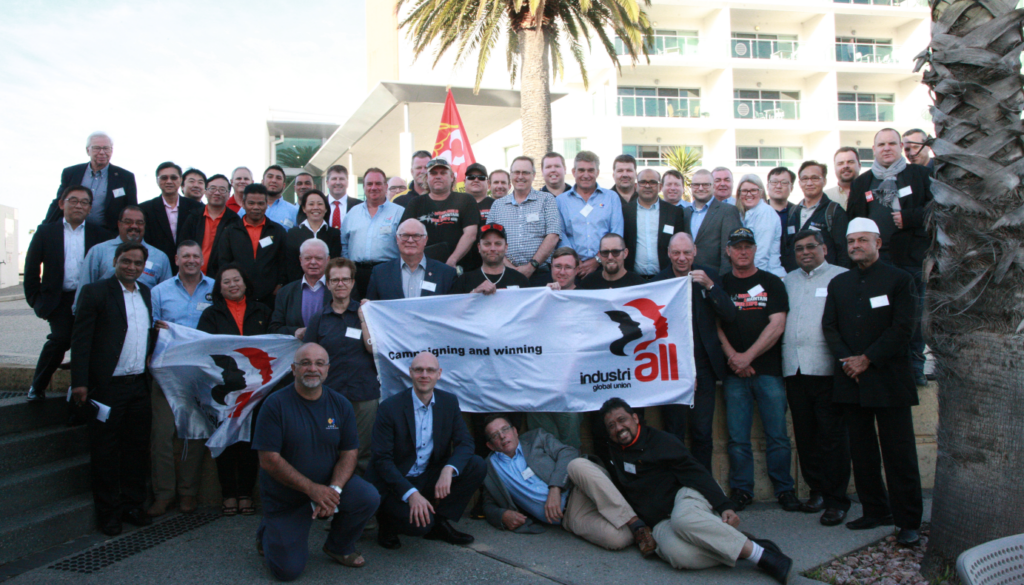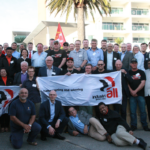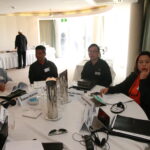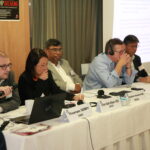Read this article in:
English
28 November, 2016More than 60 participants from 18 unions gathered in Mandurah, Western Australia for the IndustriALL Global Union Shipbuilding Action Group meeting on 7-8 November 2016.
Sixty-two participants from unions in Australia, Bangladesh, Brazil, Chile, Denmark, France, India, Japan, Korea, Netherlands, Norway, Singapore, UK, and USA met to address key issues, including:
- global trends in shipbuilding and shipbreaking industries
- occupational health and safety (OHS), organizing, and fighting precarious work
- sustainable industrial policy
- developing trade union networks and strengthening solidarity
- future activities and follow-up action plan
Andrew Dettmer, national president of Australian affiliate, AMWU, welcomed all participants as host union together with Mr. Garlett who gave a traditional aboriginal Australian greeting. Dettmer insisted on the importance of campaigning until asbestos in all its forms is banned and removed from the workplace, especially since shipbreaking workers face regular exposure to the killer substance.
V.V. Rane, vice-chair of the sector, deplored the terrible industrial homicide on 1 November at the shipbreaking yard in Gadani, Pakistan and all the delegates paid a moment of silent tribute to the victims of the tragedy. Rane pointed out the need for strengthening action to combat the unacceptable health and safety conditions in the shipbreaking industry.
Eileen Yeo, co-chair of the sector, reported that the offshore shipbuilding industry has been heavily damaged by sluggish oil and gas prices. She said unions must work on how to secure sustainable jobs in the sector.
Satoshi Kudoh, co-chair of the sector, speaking by Skype, said that it will be essential to strengthen worldwide action on the campaign for the Hong Kong Convention for the Safe and Environmentally Sound Recycling of Ships, as well as promoting sustainable industrial policy such as Industry 4.0.
The shipbuilding industry has been facing serious overcapacity as the world economy slows down. In recent years, virtually all shipyards have been suffering from very low levels of new orders that are not able to maintain the current level of shipyard capacities and employment. This overcapacity also causes market distorting practices, which can create major structural problems even in the most efficient shipbuilding industries. For example, the Chinese government’s subsidies to the shipbuilding yards in the country, are considered to be damaging shipyards worldwide.
Participants at the meeting heard how shipbuilding workers in Brazil, Norway, and South Korea have been facing massive layoffs in recent years. In South Korea, KMWU and seven other unions united and formed the Shipbuilding Industry Trade Unions Solidarity – SITU, which has been fighting against restructuring by employers and the government, and demanding secure jobs and to maintain the skills of workers.
The restructuring process is also being seen in the naval sector. Goverments are reducing naval industry costs and/or trying to outsource labour intensive jobs. In Australia, union campaigns such as Design, Build, Maintain our Ships Here and SUBS=JOBS led by AMWU have been successful in saving shipbuilding jobs.
On the contrary, the shipbreaking industry will continue to grow in the next 25 years and employment will gradually increase. Improving standards and health and safety is a pressing need in South Asia (India, Bangladesh and Pakistan) where more than 76 per cent of the world’s shipbreaking is located and which is characterized by dangerous working conditions and poor environmental protection.
Serious accidents continue in the shipbreaking yards in Bangladesh and Pakistan. Shipbreakers and ship owners, who are ultimately responsible for the safety of the workers, have offered nothing or very little compensation to the victims of these accidents. A fair compensation scheme and proper OHS are urgently needed for shipbreaking workers. The Action Group reaffirmed its commitment to worldwide action on the ratification of the Hong Kong Convention which would help to avoid any unnecessary risk to human health, safety and the environment.
Forming trade union networks is also a key strategy to increase the negotiating power of unions vis-à-vis multinational corporations at the global level. The BAE trade union network has been developing since its creation in 2014. French and Australian unions have also begun to cooperate regarding a submarine contract made between the two countries to ensure that workers on both sides of the globe get a good deal.
The Action Group also discussed ways to build affiliates’ capacity to develop and implement their own vision of sustainable industrial development.
Participants committed to keep improving the Action Plan adopted at the World Conference in 2014 and focus on the following activities for 2016-2018.
- Strengthening activities on occupational health and safety and demanding safer workplace at all levels.
- Focusing shipbuilding-shipbreaking industry trends and solidarity action.
- Developing and advancing the processes of creating strong trade union networks.
- Collaborating with all stakeholders to demand that states expedite ratification of the Hong Kong Convention to secure shipbreaking workers’ safety and jobs.
- Increasing women’s participation at all levels of union activities.
- Developing collaborative activities to achieve sustainable industrial policies with other related sectors.
The Action Group also confirmed support for the resolution to ban asbestos adopted at the meeting of unions, NGOs and asbestos groups, meeting under the auspices of SEABAN in Jakarta, Indonesia in early November.
In the afternoon of 8 November, participants visited the BAE Systems shipyard located in Henderson, Western Australia. The company mainly works for the Australian Defence Force (ADF) and employs 3,500 workers in Australia. The participants learned the activities and industrial relations in the yards.




